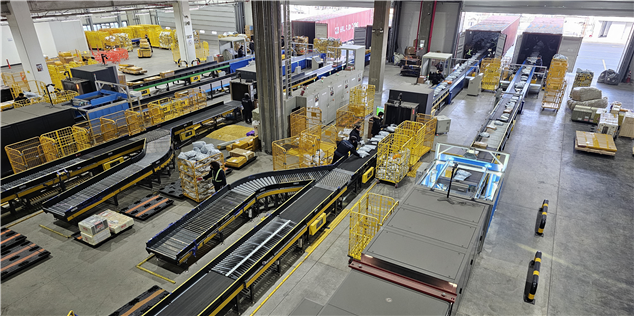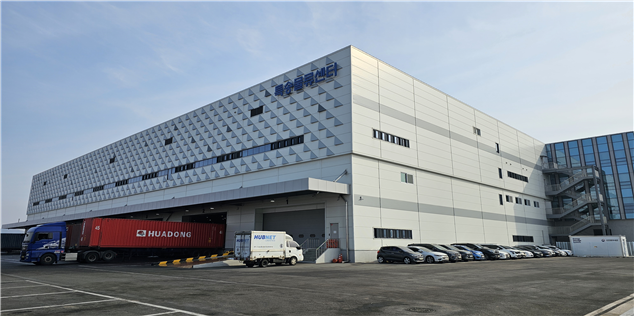The Korea Customs Service’s digital innovation and e-commerce
26 october 2025
Por Ms. Lim,Ju-yeon, External Relations Division, Korea Customs ServiceE-commerce has become a dominant form of cross-border trade in Korea. This article highlights the initiatives taken by the Customs administration to increase its enforcement capacities in this domain while facilitating clearance to meet public expectations.
The Korea Customs Service (KCS) defines e-commerce commodities as “goods transacted electronically through virtual businesses such as online marketplaces and cyber-malls.” Even offshore economic operators selling products online and wishing to send products to Korea are required to register their businesses in Korea.
With the rapid expansion of the digital economy, the volume of e-commerce goods entering and exiting the Korean territory has grown from 63 million transactions in 2021 to 180 million in 2024, nearly a threefold increase.
This rapid growth has yielded new challenges. Detection of smuggling attempts that exploit simplified clearance procedures and cases of harm to consumers are both increasing. For instance, the volume of narcotics found in shipments transported by postal operators and express delivery companies, a major channel for transporting inbound e-commerce goods, was 2.2 times higher in 2024 than in 2021. This can be partially explained by the improvement of Customs targeting capacities, but it is also clearly linked to a surge in the volume of transactions.
AI-Based selectivity
In response, KCS established the Customs Border Targeting Center in 2017 and launched an AI-based integrated risk management project in 2018, recognizing that AI-driven analysis is essential to modern Customs operations.
The system applies machine learning and deep learning for large sets of declarations, leveraging seizure history databases. It complements traditional tools such as rule-based analysis and data mining. In 2025, focus was put on shipments transported via postal operators and express delivery companies. The AI model analyzes historical data for each key indicator category such as entry patterns.
Establishing an AI- based Integrated Risk Management System
Despite a 2.85-fold surge in e-commerce imports over the past five years (from 64 million to 181 million shipments), the time required to analyze high-risk cargo has fallen from about one hour to under one minute. Low-risk cargo is cleared without any delay, yielding estimated annual savings for the KCS of approximately KRW 125.7 billion.
Automatic threat recognition
All items transported via the mail or express cargo chain go through an X-ray scanner. In 2017, a research project was launched to test the possibility to develop an efficient automated object recognition algorithm that will enable scanners to recognize objects, to connect with the automated targeting system and to display the name of objects on top of the scanned image to assist image analysts.
In 2019, KCS started setting up the technical infrastructure required, and, in 2020, it carried out the process of training the machine to recognize certain items of interest, such as guns. The algorithm analyses pictures based on their shape, density, and texture, and even atomic numbers.
Since 2023, an AI-based solution integrating X-ray images generated by NII equipment and cargo manifest data into a single display has been deployed at key entry points, including international postal and express delivery logistics centres.
Continued field testing, together with the enhancement of the AI model, is expected to establish this system as a valuable support tool for on-site screening officers and to contribute significantly to preventing the smuggling of prohibited items.

E-commerce dedicated clearance platform
Currently, information related to a purchase is submitted to Customs by the delivery company and the declarant who collects it from the buyer or seller. KCS captures data and analyses it through its automated targeting system. Postal operators and couriers are obliged to send information requested for clearance electronically, to permit the pre-advice and potential pre-clearance of items. To do this, postal operators use the electronic version of the CN 22 and CN 23 forms developed by the WCO and the Universal Postal Union (UPU).
Since 2014, delivery service providers have also been required to report the actual destination of express cargo to KCS once delivery is complete. The objective is to prevent any abuse of the de minimis facility by way of vendors splitting consignments in order to willfully take advantage of the tax exemption system and the simplified procedures for low-value goods. Once the delivery has taken place, the information is fed once again into the automated targeting system which conducts another risk analysis focusing on the delivery address.
KCS is now looking at building a new clearance system tailored to e-commerce transactions. At the center of the system is an IT platform which will enable the KCS to collect:
- data submitted via new import declaration forms adjusted to each business model and to the historical level of compliance of e-commerce vendors.
- order and payment information held by online shopping platforms.
A dedicated e-commerce portal and mobile application will be developed to provide individual importers with user-friendly services, including access to Customs clearance information, inquiry and communication channels, and statistical data. Personal authentication measures such as email verification will be implemented to strengthen the protection of personal information.
Third, a supply chain–based risk management system will be established by concentrating Customs inspections on high-risk goods.
Once completed, the platform will enable the KCS to create a safer and more efficient market environment for cross-border e-commerce.
Big Data portal
Big data can be defined as data sets of a size or type that traditional relational databases do not have the ability to capture, manage or process. In 2020, the KCS established a Big Data Analysis Division and launched the Big Data Portal to enable the collection, storage and analysis of large-scale datasets and the integration of diverse unstructured data, tasks that could not be effectively handled by the existing Customs Data Warehouse (CDW).
The Big Data Analysis Division work consists of examining the specific problems that KCS wants to solve, and the key data required to solve these problems. Once all data is collected, the team develops analysis models. More than 30 analytical models have been created so far, incorporating advanced statistical techniques, machine learning, and deep learning. This allows Customs officers without specialized technical expertise to apply big data analysis in their tasks. In cases where no pre-built model is available, officers may send a request through the portal, and the Big Data Analysis Division develops an analytical model.
When it comes to e-commerce transactions, the need to collect specific data for each online seller has been identified and the analysts worked on a “Personal Customs Code Analysis Model” which leverages data related to foreign exchange payment records and past violation history for each registered online seller.
Furthermore, to enhance its risk management capacity on all trade flows, KCS has launched the AI Innovation in Customs initiative. Currently, only a select group of experts – data analysts – have the tools and skills to ask data-related questions, analyse information, and generate reports/insights based on these insights. The initiative aims at applying generative AI to data analysis, enabling any Customs officer to ask their own questions or conduct data analysis for their own tasks. Generative AI refers to large language and multimodal models that can create original content such as text, images, videos, audio, or software code in response to user prompts. Customs officers could use it to quickly retrieve company information from import declarations, for example.

Sharing data with express carriers
Cooperation and exchange of information with express carriers is considered essential by the KCS to achieve both expedited clearance and effective risk management. Express carriers are required to sign a memorandum of understanding (MOU) with Customs in order to operate express cargo clearance procedures.
The KCS has also set out provisions on cooperation between local Customs offices and express carriers in the Customs Act.
It requires the KCS to:
- share information on seizures of narcotics, firearms, and hazardous items that threaten public health, and provide materials to enable carriers to train their staff in the detection of suspicious goods.
- assign inspection rates to carriers by risk grade.
- assess the level of compliance of each carrier periodically, including the fulfillment of obligations.
As for express carriers, they are to:
- provide Customs with information obtained during their business operations, ensure accurate declarations, and conduct employee training.
- report cargo inspection rates.
Leveraging information from market surveillance agencies
KCS also cooperates with other government agencies to enhance its enforcement capacities. For example, it requests government agencies controlling the compliance of imported products with safety and quality requirements to report cases of illegal, defective, or hazardous goods. Such cooperation mechanisms are set out in inter-agency agreements, ensuring risk intelligence and expertise are shared across ministries, promoting the conduct of joint analysis, and enabling experts to be dispatched where they are needed.
Conclusion
E-commerce imports now account for more than 90% of goods entering Korea, and their share continues to grow each year. KCS has pursued sustained efforts to better control this flow of goods, harnessing technological innovation and institutional reform, establishing itself as a leading model for e-commerce Customs clearance. Yet, any risk management strategy based on information collected at the national level has limitations and the KCS considered it is essential to strengthen information sharing and cooperative frameworks among Customs administrations, led by the WCO, to ensure secure and seamless cross-border trade.
More information
Contact the author

